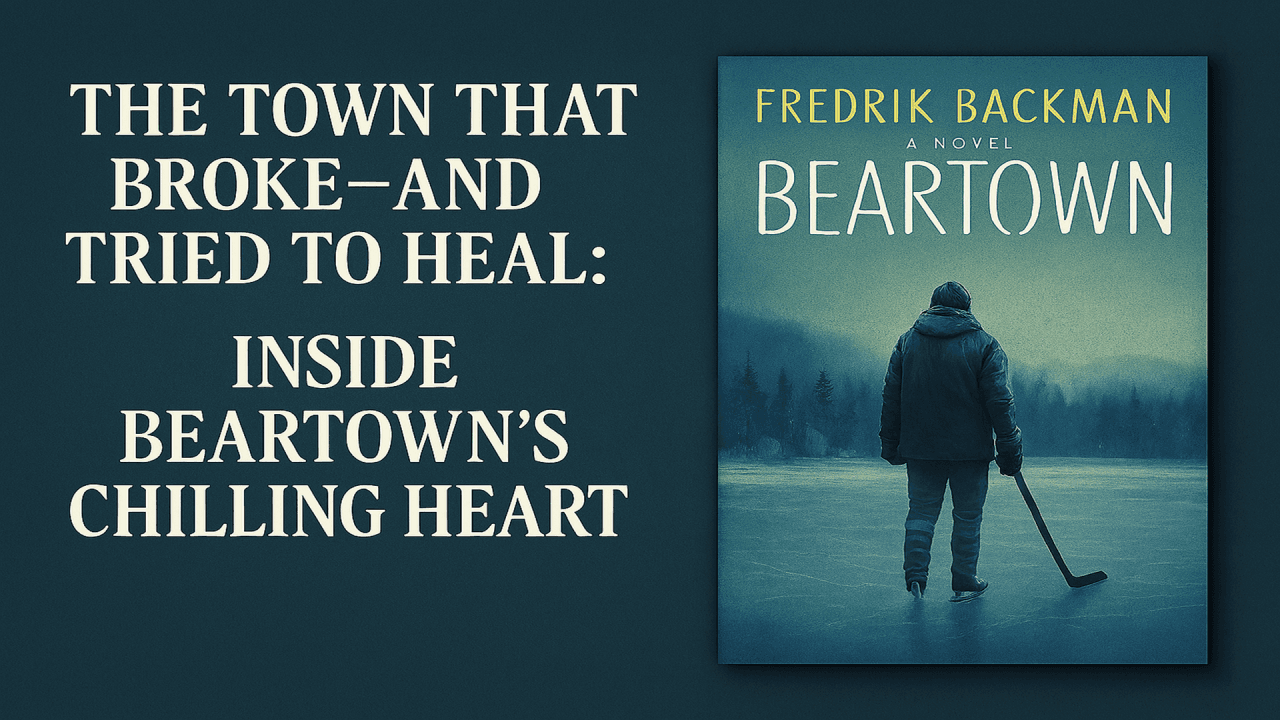You thought you were picking up a sports novel. Maybe something light about hockey, teamwork, and small-town dreams. You were so, so wrong.
Fredrik Backman's Beartown isn't just a book—it's an emotional sledgehammer wrapped in the deceptive packaging of a cozy Scandinavian town story. Since its 2017 release, this novel has been quietly destroying readers worldwide, one perfectly crafted sentence at a time.
What Happens When Everything Falls Apart
Beartown is dying. The factory is closing, young people are leaving, and the only thing keeping this Swedish town alive is hockey. The junior team is on the verge of a championship that could save everything. The pressure is suffocating. The stakes couldn't be higher.
Then, in one night, it all implodes.
When a star player commits a sexual assault, the town doesn't rally around justice—it rallies around protecting what matters most to them. And that's when Backman reveals his true genius: showing us exactly who we become when forced to choose between what's right and what's convenient.
The Characters Who Will Haunt Your Dreams
Maya - A 15-year-old whose life is shattered, forced to watch her community choose silence over support
Peter - The general manager torn between his daughter and the sport that defines him
Kira - A mother discovering that love isn't always enough to protect your children
Kevin - The golden boy whose actions reveal the rot beneath the surface
Benji - The teammate hiding secrets that could destroy him
Backman doesn't give us heroes and villains. He gives us humans—flawed, complicated, heartbreakingly real humans who make choices that will leave you staring at the ceiling at 3 AM.
Why This Book Hits Different
Beartown arrived at the perfect cultural moment. Written before #MeToo exploded into global consciousness, it predicted every uncomfortable conversation we'd have about power, silence, and complicity. Backman didn't just write a novel—he wrote a prophecy.
The hockey isn't really about hockey. It's about how communities create gods out of teenage boys and then act surprised when those boys believe they're untouchable. It's about how we sacrifice individuals for institutions, how we choose collective comfort over individual justice.
The Sentences That Break You
Backman's prose is deceptively simple, each word chosen with surgical precision:
"Sometimes we have to do things that we know are wrong, but we do them anyway because we're human."
"The love of a parent for a child is the only form of love that is supposed to end in separation."
"We don't have a choice about what we are, but we have a choice about what we do with what we are."
These aren't just beautiful lines—they're philosophical grenades that explode in your mind hours after reading.
The Uncomfortable Mirror
The most disturbing thing about Beartown isn't the assault itself—it's recognizing how easily we become complicit in systems that protect the wrong people. Backman holds up a mirror to every reader and asks: What would YOU have done? How would YOU have reacted?
Most of us don't like the answer.
Why It Matters More Than Ever
In our current era of tribal politics and choose-your-own-reality news cycles, Beartown feels impossibly relevant. It's about what happens when loyalty becomes more important than truth, when protecting an image matters more than protecting people.
The book doesn't provide easy answers because there aren't any. Instead, it forces us to sit with discomfort, to examine our own capacity for moral compromise.
The Trilogy That Keeps Gutting You
Beartown is actually the first in a trilogy (Us Against You and The Winners complete the series), and somehow Backman manages to dig even deeper with each installment. If you think you've recovered from book one, books two and three are waiting to finish the job.
The Bottom Line
Beartown is literature disguised as popular fiction. It's a book that changes how you see your own community, your own family, your own capacity for both cruelty and courage.
You'll finish it feeling simultaneously hopeful and devastated. You'll recommend it to everyone while warning them to prepare for emotional carnage. You'll find yourself thinking about it months later, usually at the most inconvenient times.
Fair warning: This book will ruin you for lesser novels. Once you've experienced Backman's ability to excavate the deepest truths of human nature through the story of a small town and its hockey team, everything else feels shallow.
Read it. Ugly-cry through it. Then force everyone you know to experience the same beautiful devastation.
Because sometimes the books that break us are the ones that make us whole.
Have you read Beartown? Still recovering from the emotional damage? Share your therapy bills—I mean, thoughts—in the comments below.

